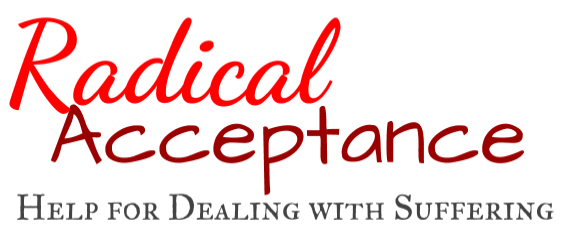If you missed the last post, we’ve been talking about how it feels to have your life plans pulled out from under you — to step off the airplane to begin your vacation in Italy only to find that you’ve been flown to Holland instead.
It’s easy to say that you just have to adjust and learn to appreciate Holland. But how do you actually do it?
The answer is radical acceptance. Have you ever been super late to an important event — a wedding, a birthday party — and found yourself stuck in traffic? You know that moment when, at the height of your agitation, your dashboard clock finally convinces you that you’re never going to arrive on time? The moment when you finally accept that reality? You call and offer your apologies and then sit and watch the line of cars in front of you creep along. And even though you’re still frustrated, there’s a peculiar relief that floods your body upon accepting reality. Suddenly, you can turn the radio on and watch the raindrops on the window. You’re released from the clutches of angst. That’s what radical acceptance does for you.

Some things are harder to accept than being stuck in traffic, but the principle remains the same. Radical acceptance is the beginning of finding peace with a difficult situation.

Here are some things to know about the concept:
1. Radical acceptance starts as a choice you make. It sounds so easy to say, “Just accept it!” In fact, you may have had someone say to you at some point, “Just get over it!” That’s not radical acceptance. That’s someone else imposing their timeline on you. Radical acceptance begins as a choice from your heart and mind. “Accepting” sounds too big to be possible in some circumstances, but begin by “turning toward acceptance” with a declaration. I literally say out loud, “I’m choosing to radically accept this.”
2. It’s called radical for a reason. Some things don’t seem possible to accept: a death, the loss of a relationship. Even when you can’t comprehend the idea of accepting what’s happened in your life, you can “turn toward acceptance.” It may be the last thing you want to do, but sometimes it’s exactly what you need.

3. It’s not a magic wand. You know when the Psalmist and Peter — and probably umpteen other folks in Scripture — instruct us to cast our cares on the Lord? I don’t know about you, but I’m always the one going back and picking up my big sack of worries again and again, even after I’ve supposedly given it to Him. For this reason, radical acceptance isn’t just a one-time wave of the magic wand that fixes everything. In our traffic example, you might be able to turn toward radical acceptance once and find relief. In more extreme situations in life, you might have to turn toward radical acceptance over and over and over. Every day you might need to wake up and turn toward it all over again.
4. Radical acceptance doesn’t mean approval. You don’t have to like what happened to you or believe that it should have happened. You don’t have to believe that you deserved it. None of that is necessary to accept. Acceptance isn’t approval — it’s just admitting that reality is reality. When you’re avoiding acceptance, you’re weaving your pain into a sticky web of suffering and brooding over the should’ves, could’ves, would’ves. When you radically accept reality — even if you don’t approve — you allow yourself to feel the present pain and then let it go. You don’t have to like the truth to accept it, and accepting it doesn’t hurt you.
5. Sometimes suffering feels safe because it’s what you know. Sometimes the most difficult part of letting go of suffering and turning toward acceptance is leaving behind the warm cocoon of pain that has become your home. Not a hospitable home, admittedly, but a home nevertheless. It might feel safer to continue to suffer. It might feel more reverent of what you’ve lost to continue to suffer — as though the size of your pain shows the size of your love. Recognizing these thoughts in ourselves and realizing that they’re keeping our anguish alive will allow us to turn toward acceptance. Suffering isn’t helping us or others.
6. You have to radically accept that sometimes you’ll fail to radically accept. You are going to handle things badly. You’re going to miss a flight and throw a temper tantrum in the terminal. You’ll neglect to order the present soon enough for Christmas and be huffy about it for a week. You’ll be snippy to your husband for putting the dishes in the dishwasher “wrong” (because we all know there is a right way and a wrong way to put dishes in the dishwasher). And you’ll look back on these things and feel like a failure. Why couldn’t you just be ZEN and ACCEPT ALL THE THINGS and RISE ABOVE? Because you’re human. You can apologize to people you hurt, but then turn towards radically accepting that reality, too. All you can do is keep practicing.

6. Dessert cures a host of evils. Okay, really, this has very little to do with radical acceptance and a lot to do with good, old-fashioned comfort. I needed some of that this week. It’s been cold and rainy and I’m coming down with one of those sore-throat-coughy type illnesses. I wanted something rich and indulgent and a little bit grown up.
These mocha mousse bars are so insanely good. They combine a buttery shortbread crust, fudgy bittersweet ganache, creamy coffee mousse with a splash of Bailey’s Hazelnut Liqueur, and a dark chocolate covered espresso bean. If you love tiramisu or a good mocha, you’ll love these bars. Enjoy — and accept.
What’s the most difficult thing you’ve tried to accept lately?
I’m far from a therapist, but I’ve been sharing thoughts lately based on personal experience handling hard times. Read the full series, Managing Life’s Difficult Emotions:
1. Welcome to Holland: Dealing with Life’s Unplanned Detours
2. Radical Acceptance: Help for Dealing with Suffering
3. Opposite Action: Changing Actions to Change Emotions
One year ago: Moist Fluffy Coconut Cake
Two years ago: Winter Breakfast Chili Over Eggs in Sourdough Bowls
Three years ago: Southern Pimento Cheese with Lavash Crackers
Four years ago: Cinnamon Roll Cookies






































































